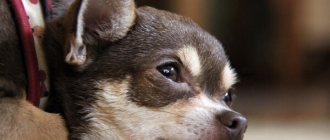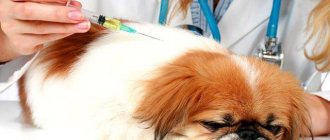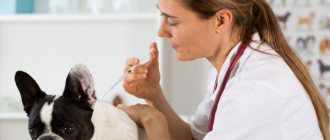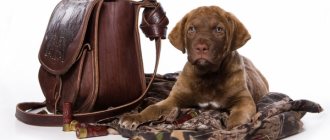Hello, I purchased a 2-month-old Siberian Husky puppy. A number of questions arose:
- They told me to give him an anthelmintic a week before the first vaccination; worms were found in the feces. Should I do it again or am I allowed to take it for vaccination?
- If the answer is yes, how many days later should I vaccinate?
- What vaccinations are needed? They said to do one, and after 3 weeks - a second. Please explain what kind of vaccinations are they? I would like to ask the veterinarian what is being done for my pet.
- There is an adult dog living in the house. Should I give anthelmintic? They gave it three weeks ago before the scheduled vaccination.
Answer
Huskies need vaccinations. Siberian dogs have good health, but there is a risk of contracting an infection. Vaccination protects the animal from disease and helps to form a strong immune system.
It is worth understanding why vaccinations are needed. The vaccine is a multiply weakened virus injected individually into the dog. After the injection, the animal expects a mild form of illness; as a result, the body produces antibodies to the infection. Bodies are preserved in the blood from a year until the end of life.
If the injection is given to a sick dog, it is possible to aggravate the course of the disease; before taking the drug, the animal is shown to a veterinarian.
Sometimes allergic reactions occur. Symptoms are mild - redness of the injection area. Sometimes there are serious consequences, for example, anaphylactic shock. Such a turn of events cannot be ruled out. If this happens, the animal will need emergency veterinary care. Anaphylactic shock is manifested by shortness of breath, the mucous membrane turns blue, and salivation is present. The dog is given antihistamines and a veterinarian is called.
After vaccination, the husky may get sick. Refuses food and walks. Don't be afraid, the behavior is natural and will go away soon.
Today the market is filled with vaccination drugs, it’s worth understanding so as not to get confused. There are two types of vaccinations for dogs:
- The first type, mono-vaccines, help build immunity to fight a single disease.
- The second is complex vaccines that protect the body from a number of diseases. The species is divided into dead and living. Dead vaccines are made from dead bacteria and do not cause disease. Living ones are saturated with living, weakened microorganisms, after which a mild form of the disease may appear.
To find out which type of husky is suitable, contact an experienced veterinarian.
Vaccination scheme
Dogs that are absolutely healthy and free from parasites are vaccinated. Before the procedure, you need to undergo treatment with anthelmintic drugs, which can be purchased at any pharmacy at a veterinary clinic in Moscow. To ensure that the animal is completely healthy, it is necessary to monitor its body temperature for 48 hours before vaccination. Pay attention to your pet's behavior and appetite. The schedule of procedures must be strictly followed; it is selected by the veterinarian individually for each dog. Your doctor should tell you in detail what vaccinations are needed and how often they are given. All dog owners should know this information.
There are a number of deadly diseases for which pets should be vaccinated. Otherwise, the pet’s fate in case of infection will be extremely sad.
It is imperative to vaccinate your pet against rabies. This disease is dangerous and contagious to surrounding animals and people. Dogs suffer from rabies and die. The vaccine itself will not harm the pet; dogs tolerate it easily. Rabies vaccination is required annually.
Plague is a terrible infectious disease, the symptoms are extremely painful for the animal, which eventually dies. In some cases, after the procedure, the pet may be lethargic and eat little, this is normal. These symptoms last 2-3 days.
Parvovirus gastroenteritis is an intestinal disease that leads to complete dehydration of the body. A vaccine against this disease is a good prevention.
Leptospirosis is a fatal infectious disease during which the animal “burns out” very quickly. Puppies are vaccinated to prevent the disease.
Owners should know that there are single and complex vaccines. A single vaccine protects a dog from a specific disease, while a complex vaccine successfully fights several. It is better to choose a complex vaccine; this is an opportunity to simultaneously vaccinate your pet against the most common and dangerous canine diseases.
When is the best time for Huskies to be vaccinated?
Don't rush into vaccination. If the mother is vaccinated on time, the antibodies are passed on to the puppies. Then the vaccination should be postponed; at an early age there will be no benefit, maternal antibodies will kill the bacteria.
Maternal protection disappears at one and a half months of age, during which time the puppy is vaccinated. If the mother has not received the serum, the best age for preventive measures is considered to be 1.5 months, but veterinarians advise carrying out the procedure within a month and repeating the procedure at two months.
Which method is better is up to the owner to decide; both methods work. It is worth remembering about quarantine. The puppy should not have contact with the outside world for two weeks. The body is weakened, it needs to be protected from viruses, immunity after the injection will be restored on the fourteenth day.
What is the cost of puppy vaccinations?
How much does this service cost? The cost is determined by various factors. The price of primary vaccination depends on the rating of the clinic and doctor, the time of visit (most veterinary clinics are open 24 hours a day). The price will directly depend on whether you call a veterinarian at home or go to the hospital yourself. The city of residence also has a big influence. On average, the first vaccination for a puppy costs from 1 to 2 thousand rubles. Subsequent procedures will be cheaper, since the cost of the first visit also includes a medical consultation.
How to properly vaccinate a Husky
Before vaccination, the puppy is prepared for the process. Two weeks before vaccinations, deworming is performed. After the injection, the body should not be loaded; it is better to give the animal the right to choose, let it do what it wants. If the last vaccination occurred in the winter, it is worth rescheduling the vaccination until the spring. In winter, the dog’s body is weakened and the immune system is not protected. Vaccination may harm the puppy.
It is important to remember that the serum is stored in the refrigerator, otherwise the vaccine will deteriorate, will not be beneficial in the future and can cause harm. When purchasing a drug, the owner must ensure proper storage. Be sure to look at the expiration date indicated on the ampoule or packaging. The quality of the vaccine may be affected by a slight violation of the serum storage conditions.
Regarding the vaccination process. It is acceptable to inject the owner yourself. The injection is injected into the femoral part of the hind legs or into the withers.
Veterinarians recommend vaccinating huskies at the withers. At home, the animal is pinched between the legs, immobilizing it. Afterwards the skin on the withers is pulled back and the drug is injected. If the owner is unable to vaccinate the animal, it is better to consult a doctor.
Caring for a vaccinated dog
Upon returning home, the dog needs to be given rest and plenty of fluids. During the day after vaccination, the following symptoms may be observed: weakness, fever by 0.5–1 degrees, decreased appetite, swelling at the injection site, diarrhea or vomiting.
The dog must be quarantined for 14 days after vaccination, this helps prevent the development of complications. At this time, limit contact with other animals, avoid keeping your pet in the heat or cold, in a draft, and do not allow excessive physical activity. It is not recommended to wash it in the first 3 days. Short walks are allowed provided that the weather is good outside and the walking area is free from other animals. Puppies are walked in their arms.
Risk groups for the development of pneumococcal infection in adults
Vaccination with the pneumococcal vaccine is recommended for individuals at high risk of developing iPI. Such patients can be divided into 2 groups: immunocompetent and immunocompromised.
The immunocompetent group includes the following patients:
- with chronic bronchopulmonary diseases (COPD, asthma) with concomitant pathology in the form of chronic bronchitis, emphysema, with frequent relapses of respiratory pathology;
- with cardiovascular diseases (coronary artery disease, heart failure, cardiomyopathy, chronic heart failure, etc.);
- with chronic liver diseases (including cirrhosis);
- with diabetes and obesity;
- those sent and in special conditions of stay: organized groups (military personnel and conscripts, people working on a rotational basis, staying in places of detention, social institutions - homes for the disabled, nursing homes, boarding schools, etc.);
- suffering from alcoholism;
- smokers;
- workers in industries that are harmful to the respiratory system (those with increased dust generation, flour mills, etc.), welders;
- medical workers;
- aged 65 years and older;
- convalescents of acute otitis media, meningitis, pneumonia;
The immunocompromised group includes the following patients:
- with congenital and acquired immunodeficiencies (including HIV infection and iatrogenic immunodeficiencies);
- receiving immunosuppressive therapy, including immunobiological drugs, systemic glucocorticosteroids (≥ 20 mg prednisolone per day), antitumor drugs;
- those suffering from nephrotic syndrome/chronic renal failure requiring dialysis;
- with cochlear implants (or subject to cochlear implantation);
- with leakage of cerebrospinal fluid;
- those suffering from hematological malignancies receiving immunosuppressive therapy;
- with congenital or acquired (anatomical or functional) asplenia;
- suffering from hemoglobinopathies (including sickle cell anemia);
- on the waiting list for or after organ transplantation.
Summing up
It has been scientifically proven that an animal that has recovered from an infectious pathology tolerates re-infection more easily. During the course, injections/vaccinations will not allow your Northern Sled Husky Husky to catch a viral infection; in the worst case, the pet will suffer a mild form of the disease. Huskies need vaccinations - this is a time-tested practice of building immunity to a whole series of serious diseases.
- health
- Husky
If you find an error, please select a piece of text and press Ctrl + Enter.
When to vaccinate a puppy: why it is not recommended to visit a veterinarian before 2 months
photo from the site: RANDRS.ru
Some people believe that the sooner they take their puppy to the vet, the better it will be for him, but this belief is only formed from a lack of information. Why can't you hurry? Next, we present two fairly weighty arguments:
- The first has already been announced: the vaccine will not work properly because maternal antibodies will interfere with it. The effect of such an injection will be zero.
- The second is this: the baby’s immunity has not yet formed and is working at half its capacity. Do you want to get the expected results from your visit to the doctor? Then wait up to 2 months.
However, everyone knows that for every rule there is an exception. It also exists for vaccinating our little brothers.
What is rabies?
Rabies is an acute infectious disease of the nervous system that causes irreversible changes and is fatal in 100% of cases. All warm-blooded animals, including dogs, are susceptible to the virus caused by rabies.
Rabies is dangerous due to its long incubation period. The virus that causes the disease moves rather slowly through nerve cells. It can take weeks for it to reach the brain or spinal cord, and until then no signs of rabies will be noticeable.
Complications and possible negative consequences
A slight deterioration in health after vaccination is considered normal, but if the symptoms do not go away or worsen, then there are complications and measures need to be taken. The reason for contacting a doctor should be:
- temperature rise to 40 degrees and above;
- refusal of food and water;
- convulsions;
- breathing problems;
- development of an abscess at the injection site;
- vomiting and diarrhea a day after the injection;
- profuse salivation.
Share with friends!
Preparatory activities
Effective vaccination is facilitated by strict adherence to veterinary norms and rules:
- deworming and treating the husky puppy against ticks and fleas 10–14 days before vaccination;
- mandatory visual inspection of the animal, checking the absolute health of the animal;
- proper rest for the dog on the eve of the procedure;
- injections strictly on an empty stomach.
- introduction after procedural quarantine.
Vaccination is carried out only by a qualified immunologist in compliance with all antiseptic rules. Husky vaccinations are carried out with a disposable syringe into the withers (or thigh of the hind leg), after holding the puppy between the legs and pulling back the skin at the injection site.
Contraindications
There is a list of contraindications for vaccination, including:
- decreased activity, lethargy, apathy;
- decreased or lack of appetite;
- increase or decrease in general body temperature;
- injuries, wounds, severe stress, overheating or hypothermia;
- thirst;
- vomiting, diarrhea, flatulence;
- purulent or serous discharge from the eyes, ears, nasal passages;
- the presence of malignant neoplasms;
- alopecia, ulcers, erythema, rash.
Only after a diagnosis has been established, a course of therapy and complete recovery has been completed, the veterinarian sets the timing of vaccinations and selects the most suitable drug.
Veterinary passport
An international veterinary passport is the most important document for a dog, without which long trips with a dog around the country, travel abroad, participation in exhibitions and breeding are impossible.
The most important points of a dog’s veterinary passport are:
- vaccination against rabies and other infectious animal diseases;
- flea and tick treatment;
- deworming;
- reproduction.
The document also contains information about the owner of the animal, identification (in the case of implantation of an electronic chip) and some characteristics of the dog, in particular gender, color and special features.
Necessity
The word “vaccination” means a special vaccine that is administered to an animal at certain periods of life and protects its body from the action of infectious agents.
The vaccine may contain live weakened or killed microorganisms. The introduction of these drugs reduces the risk of possible infection of the pet when encountering an infection, and in the event of a disease, it reduces the severity of complications. Therefore, vaccinating a dog is a top priority for any owner.
Immune theory
A well-functioning husky dog vaccination system contributes to a sharp reduction in the animal's morbidity. Vaccinating a Husky is a way to stimulate your dog's immune system to protect against infection or disease.
Immunity is an acquired (or innate) skill to resist the negative effects of viruses and bacteria. In the case of passive immunization, antibodies to shaggy newborns enter through the placenta of a toothy mother: puppies have protection for a short time from a number of pathogens of infectious pathologies. To systemically strengthen the immune system, there is a well-established and well-proven program of regular vaccinations.
Scientists here and abroad are constantly updating the range of veterinary immunobiological drugs: there are monovalent (from one pathogen) and polyvalent vaccines.
The schedule, methodology and type of vaccine for vaccinating huskies is selected and prescribed by an expert from a veterinary clinic: amateur activities and self-medication in this area of husky life support are unacceptable.
Vaccine selection
Most experts agree on the advisability of using polyvalent drugs, which make it possible to quickly protect an animal from infection with infectious diseases.
The most widely used vaccines are:
- "Nobivak DHP";
- "Nobivak DHPPI";
- Biovac DPAL;
- "Multican-2, 4, 6, 8";
- "Kaniwak CH";
- Trivirovax;
- "Tetravac".
However, due to the fear that the pet may become ill as a result of the introduction of a large number of different viruses, some owners prefer monovalent vaccines:
- “Vakchum”, “Multikan”, “Canivac C” against plague;
- "Nobivak Parvo-C", "Biovac R" against enteritis;
- "Biovac-L" and "Nobivak Lepto" against leptospirosis.
The disadvantage of this method is the lack of a monovaccine against hepatitis, as well as an increase in the vaccination period.










